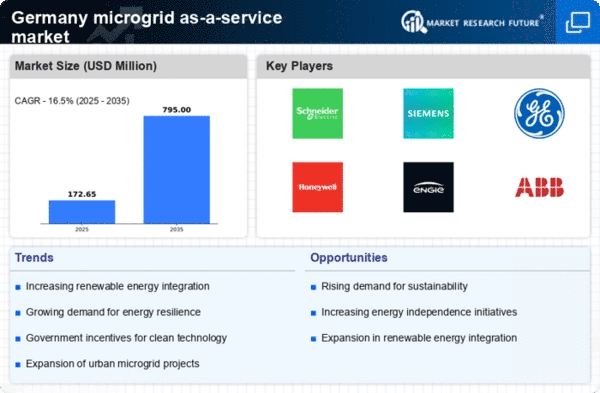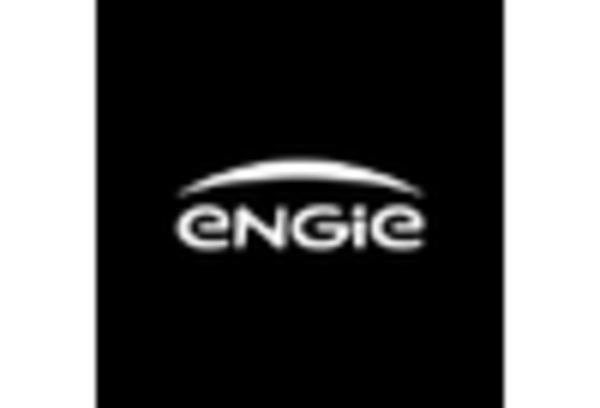Growing Demand for Energy Independence
The microgrid as-a-service market in Germany is experiencing a notable surge in demand for energy independence. As consumers and businesses seek to reduce reliance on traditional energy sources, the appeal of localized energy generation becomes increasingly evident. This trend is particularly pronounced in regions with high energy costs, where microgrids can provide a more stable and cost-effective solution. According to recent data, approximately 30% of German businesses are exploring microgrid solutions to enhance their energy autonomy. This shift not only aligns with Germany's commitment to sustainability but also fosters resilience against energy price fluctuations. The microgrid as-a-service market is thus positioned to benefit from this growing desire for self-sufficiency, as stakeholders recognize the potential for reduced operational costs and enhanced energy security.
Rising Awareness of Climate Change Impacts
Rising awareness of climate change impacts is significantly shaping the microgrid as-a-service market in Germany. As public consciousness regarding environmental issues grows, there is an increasing demand for sustainable energy solutions. Citizens and businesses alike are becoming more proactive in seeking alternatives to fossil fuels, which has led to a heightened interest in microgrid technologies. Surveys indicate that over 70% of the German population supports the transition to renewable energy sources, reflecting a societal shift towards sustainability. This growing awareness not only drives consumer demand but also encourages investment in the microgrid as-a-service market. Stakeholders are recognizing the potential for microgrids to contribute to climate goals while providing reliable energy solutions, thus fostering a more sustainable energy landscape in Germany.
Supportive Policy Frameworks and Initiatives
The microgrid as-a-service market in Germany benefits from a supportive policy framework that encourages the adoption of decentralized energy systems. Government initiatives aimed at promoting renewable energy and reducing carbon emissions create a conducive environment for microgrid development. Policies such as feed-in tariffs and investment grants incentivize businesses and communities to invest in microgrid technologies. Furthermore, the German government has set ambitious targets to reduce greenhouse gas emissions by 55% by 2030, which aligns with the objectives of the microgrid as-a-service market. This regulatory support not only facilitates market entry for new players but also fosters innovation within the sector, ultimately driving growth and adoption of microgrid solutions across the country.
Technological Advancements in Energy Storage
Technological advancements in energy storage systems are significantly influencing the microgrid as-a-service market in Germany. Innovations in battery technology, such as lithium-ion and flow batteries, have improved energy storage capabilities, making microgrids more efficient and reliable. These advancements allow for better integration of renewable energy sources, which is crucial for the success of microgrids. In fact, the energy storage market in Germany is projected to grow by over 20% annually, indicating a robust demand for solutions that can store excess energy generated from renewable sources. This trend enhances the viability of microgrid systems, as they can now operate more effectively during peak demand periods. Consequently, the microgrid as-a-service market stands to gain from these technological improvements, as they enable more flexible and responsive energy management solutions.
Increasing Urbanization and Infrastructure Development
The rapid urbanization and infrastructure development in Germany are driving the microgrid as-a-service market. As cities expand, the demand for reliable and efficient energy solutions becomes paramount. Urban areas are often characterized by high energy consumption, necessitating innovative approaches to energy distribution. Microgrids offer a decentralized solution that can alleviate pressure on the main grid while providing localized energy sources. Recent studies indicate that urban areas in Germany are expected to see a 15% increase in energy demand over the next decade. This growing need for energy efficiency and reliability positions the microgrid as-a-service market as a key player in urban energy planning. By integrating microgrid solutions, cities can enhance their energy resilience and sustainability, aligning with broader environmental goals.

















Leave a Comment